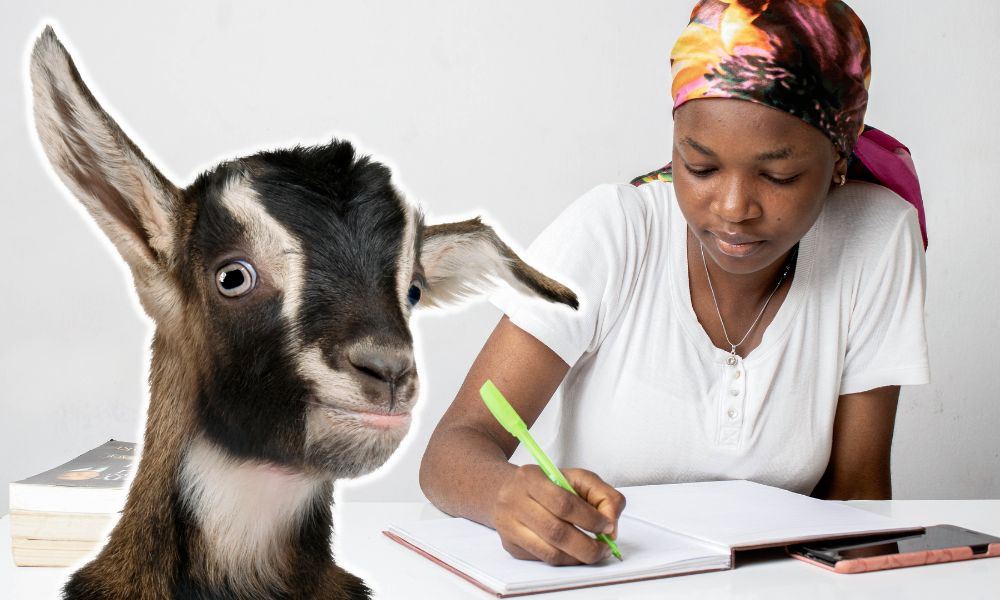Mercifully, then, the plural of goat follows the same conventions as most plurals in the English language: adding S to the end.
Though many other similar animals, like sheep and deer, do not form their plurals in this way, goats do.
They are goats, and that’s that.
Let’s look further into this.

What is the plural form of goat?
The plural form of goat is goats. If you’re learning English, you’ll be relieved to learn that goats follow the same rules for plurals as do most nouns—you just add S to the end.
There is no complex or confusing vowel or consonant changes, like leaf to leaves, or goose to geese.
You just have to add S on the end.
Goats are simple animals in that sense, when compared with other similar animals.
Sheep, for instance, have no separate plural form—you have one sheep, or many sheep.
There’s no change to the word, it’s not sheeps.
The same is true of deer, which are very closely related to goats—even more so than sheep, you may be surprised to learn.
They also have no plural form, although “deers” is sometimes used.
Generally, though, deer is plural and singular.
Though they are grouped together biologically, then, they are not grouped together linguistically.
Goat uses the typical S ending convention for plurals, whereas other ruminants like deer and other farm animals like sheep do not.
So, what about the singular form?
What is the singular of goat?
You’ve just read it!
The singular form of goat is goat.
That’s that.
One goat is one goat.
There is no other way to refer to a single goat. It’s just a goat.
That’s that one out of the way!
What is the plural of sheep?
As we’ve touched on, there essentially is no plural form of sheep—or there is only a plural form, depending on how you look at it.
You would refer to a single sheep, and you would refer to many sheep.
There’s no difference in the word between a single and a plural sheep.
It’s all sheep.
This is quite interesting when compared with goats, since the animals are ostensibly quite similar.
In reality, they’re actually not as closely related as you might think.
Goats are ruminants, descendants of animals like ibex and deer.
Sheep are descended from things like mouflon.
Though the naming conventions generally tend to come from places other than their basic biology and relation to other creatures, it is worth noting that goats and sheep have always been considered separate.
Thus, the words we have used for them have become different, too.
Let’s look at how deer are named in plural form.
What is the plural of deer?
The plural of deer, again, is deer.
This one is a bit different in that you may hear some people add an S on the end and say deers.
But that is generally not considered standard English, and isn’t in general use.
You have one deer or you have many deer.
This is again interesting given the close relationship of deer and goats.
The words simply come from different seeds, though.
Goat comes from the Old English, Duch and German, and always referred to a goat.
Deer comes from Old English, too, but the word once referred simply to any small creature.
Thus, the naming conventions were different.
Why do words form in these ways, then?
Why are plurals formed in different ways?
This is an incredibly complex question, especially in English.
When it comes to animals like goats, a lot of the answers can actually be found in a single event: the Norman Conquest of England.
When the Normans took over, French began seeping into English, and we had different words for the animals and the meat that you would actually eat.
Thus, naming became very muddled.
Then, in the centuries following, the language became even more muddled by the widespread adoption of Latin and Greek words in the language.
So, the short answer is simply that English is a highly complex language.
This leads to unclear rules and conventions which we take for granted.
The English language can be a bit of a nightmare to navigate at times, especially if it’s not your first language.
Many of its rules and conventions appear to make no sense, and it breaks them frequently.
Every language has exceptions to its rules, but few as many as English.
This is for a wide variety of complex historical reasons that it would be difficult to get into in any depth.
Just know that English is the result of the intermingling of many languages over the millennia.
